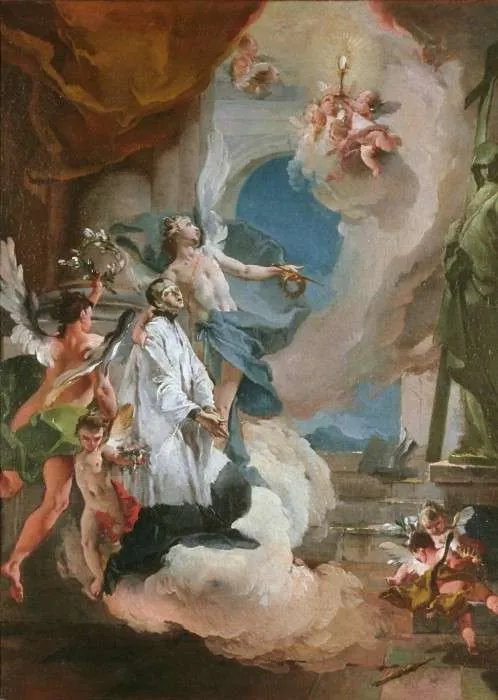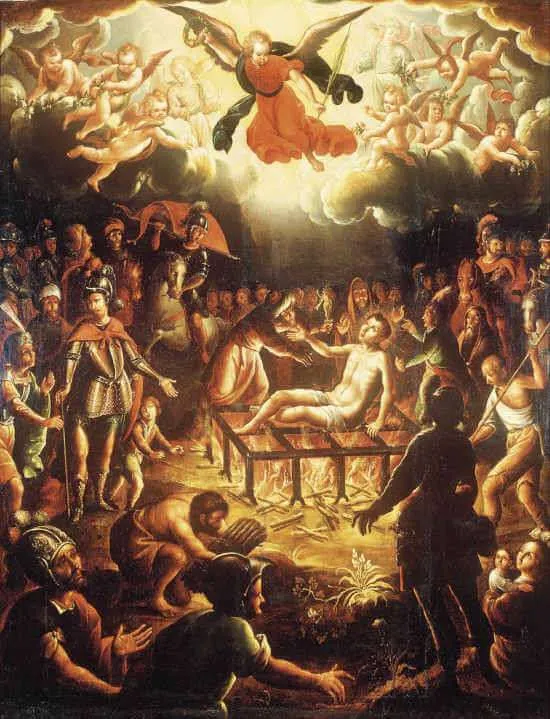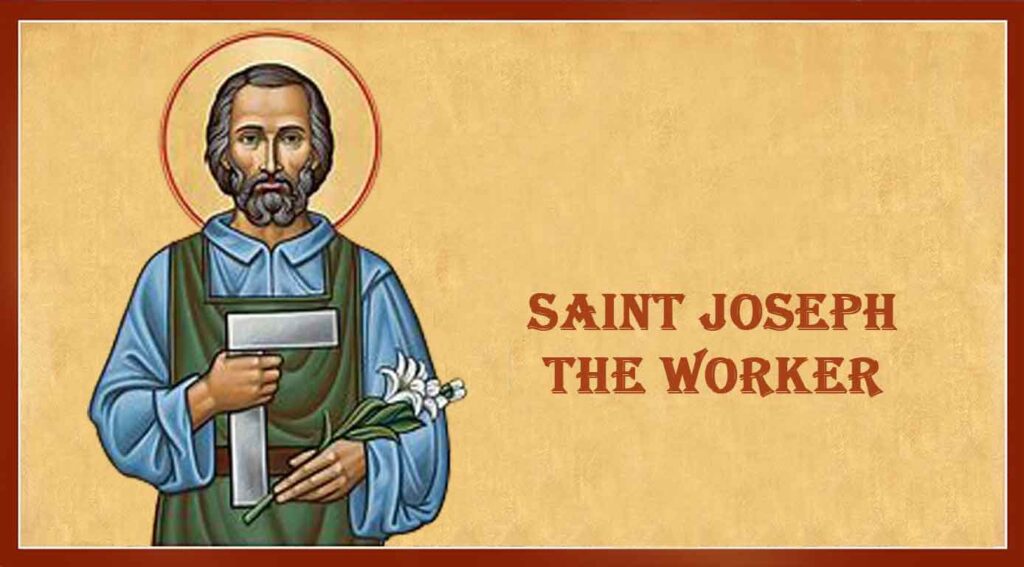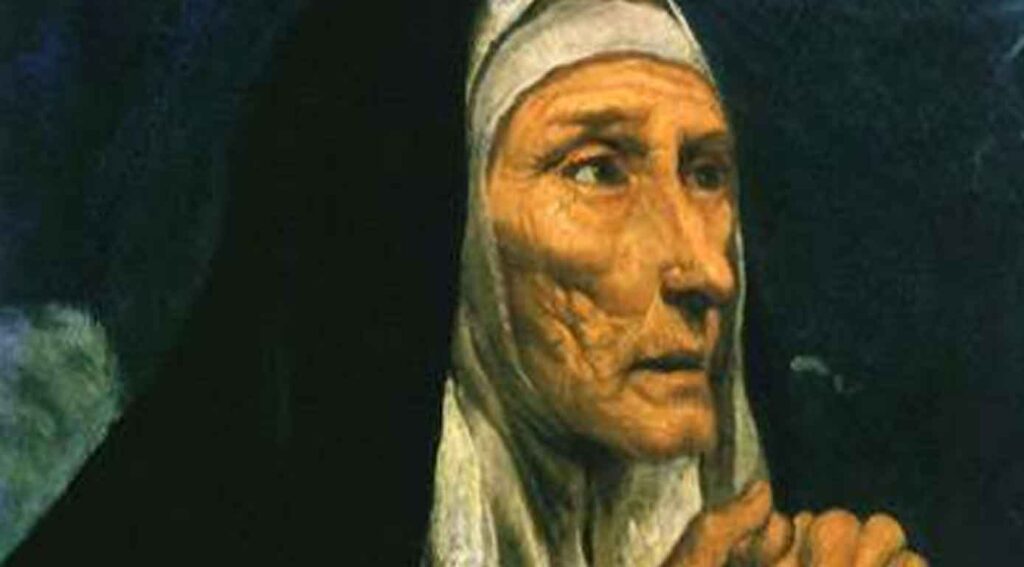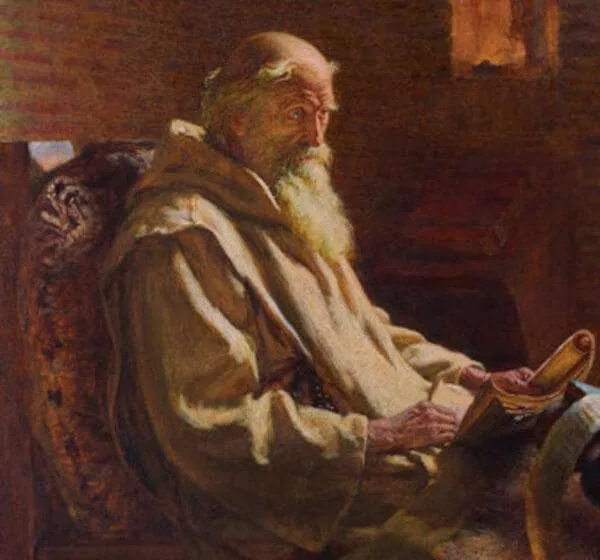1568–1591; Patron Saint of students, Christian youth, Jesuit novices, AIDS patients and caregivers; Invoked against eye troubles and epidemics; Canonized by Pope Benedict XIII on December 31, 1726
Luigi Gonzaga was the firstborn son of eight children, and the scion to a wealthy and noble inheritance. He was born into the Duchy of Mantua, modern-day northern Italy, which was ruled by his family, the princely House of Gonzaga. Luigi was the Italian version of his name; Aloysius was the Latin version. His father, Ferrante Gonzaga, was Governor of Milan, Viceroy of Sicily, and a general in the army of the Holy Roman Emperors Charles V and Philip II. As the oldest son, Luigi was expected to follow in his father’s footsteps through a military career. Ferrante began training Luigi as a soldier when Luigi was just four years old. Luigi’s mother, a devout Catholic, had different hopes for her son.
At the age of five, Luigi was sent to a military camp housing 3,000 soldiers to learn warfare and weaponry. He earned respect from the soldiers and often led them in marching, but he also picked up their rough language. When Luigi brought this language home, his mother promptly corrected him. Although the incident was somewhat innocent since he didn’t know what the words he repeated meant, his mother’s rebuke had a lasting influence on him and marked a turning point in his life. From that young age, he started to cultivate piety and a greater consciousness of moral living.
Luigi’s piety continued to flourish at the age of seven. He began to pray daily, reciting the Office of Our Lady, the penitential psalms, and many other devotions, often on his knees on a cold, hard floor. Around this time, he also endured an illness lasting about eighteen months, marked by fever and necessitating prolonged bed rest. Nevertheless, he never missed his daily prayers. Many who knew him in his childhood believed he never committed a mortal sin, given the depth of his devotion.
At the age of eight, Luigi and his younger brother were sent to Florence under the guardianship of the Grand Duke of Tuscany, Francesco I de’ Medici, a member of the influential Medici family. Florence was a thriving city, rich in culture and knowledge, exposing the boys to music, art, and science. Luigi and his brother served as pages in Francesco’s court, a role that involved household service, etiquette instruction, and establishment of important relationships for future benefits. Luigi studied Latin, literature, philosophy, and history, and was exposed to physical disciplines, such as fencing and horseback riding.
By the age of nine, however, Luigi—now using his Latin name, Aloysius—was demonstrating more interest in piety and the lives of the saints than in the worldly pursuits that made up his life at court. Most of his free time was spent learning about the faith and praying.
Ferrante brought his sons back home when Aloysius was eleven years old. After joining the court of Duke William Gonzaga of Mantua, Aloysius read a book of letters from Jesuit missionaries and was deeply moved by a letter from a Jesuit missionary from the Indies. Around this time, he made a private vow to live a celibate life devoted to God and resolved to renounce his firstborn rights. He began to embrace every virtue, especially purity, and he became so engrossed in catechetical studies and the lives of the saints that he began teaching catechism to other children.
At the age of twelve, Aloysius met then-cardinal and future saint, Charles Borromeo. After expressing his desire to be a Jesuit missionary and undergoing examination by the cardinal, Aloysius so impressed Cardinal Borromeo that he personally prepared the boy for and administered his First Holy Communion, encouraging him to receive the Eucharist frequently.
When Aloysius was thirteen, his father was required to accompany the empress of Austria to Spain and brought his children with him. The children became pages in the infant prince’s court. Aloysius continued his studies and prayer life in Spain and started to seriously consider becoming a Jesuit. His mother was thrilled when he shared this desire, but his father was enraged, even threatening physical violence. The issue was that Aloysius would need to renounce his inheritance and noble status to become a Jesuit. When some family members suggested he become a secular priest, noting that they could arrange for him to be a bishop, Aloysius refused. He felt called to the Jesuits and had no interest in the nobility’s courtly advancement, wealth, or worldly honors. When the Spanish infant prince died a year later, the family moved back to Italy.
Over the next few years, Aloysius’s piety grew, and his devotion to become a Jesuit solidified. His father and many others tried to dissuade him, even confining him for nine months. Eventually, through divine grace, hearts were softened, minds opened, and Aloysius’ father gave his reluctant consent. As a high-ranking noble, Aloysius could only renounce his inheritance and position with the emperor’s approval. Once granted, Aloysius passed his rank and inheritance to his brother and joined the Jesuit novitiate in Rome on November 25, 1585, at the age of eighteen.
Despite his noble background, Aloysius lived humbly in Rome. He advanced in prayer, often entering deep contemplation. He prayed before the Blessed Sacrament, grew in devotion to Our Lady, and always meditated on Christ’s Passion. He was obedient, manifested a pure and holy chastity, lived in poverty, and was charitable, especially towards the poor. He was also blessed to have the future Saint Robert Bellarmine as his spiritual director and teacher.
After briefly returning home to resolve a family dispute over land, Aloysius returned to Rome in 1591 when the bubonic plague was ravaging the city. Despite the widespread fear, Aloysius dedicated himself to caring for the sick, dismissing concerns for his own health. He undertook all necessary tasks to meet both the spiritual and physical needs of the sick, fulfilling his duties with profound joy. Eventually, he contracted the disease himself and endured much suffering. He embraced his suffering with much rejoicing and even prophesied the day of his death, which was revealed to him in a vision and occurred on the Octave day of the Solemnity of Corpus Christi when he was just twenty-three years old.
Saint Aloysius Gonzaga was wealthy in the things of this world and was promised everything this life could offer. However, he discovered something far more valuable—God—through a life of profound prayer and devotion. The wealth he obtained through his obedience to God’s will vastly exceeded anything he could inherit in this life. As we reflect on this youthful and holy Jesuit, consider your own dreams and desires. Like Saint Aloysius, are you prepared to relinquish everything to serve God’s will? Do you pursue genuine riches? Or are you preoccupied with the fleeting wealth of this world? Imitate this young saint’s example, and you will discover the same treasures he obtained through his fidelity to God’s will.
Source: https://mycatholic.life/saints/saints-of-the-liturgical-year/june-21–st-aloysius-gonzaga/


